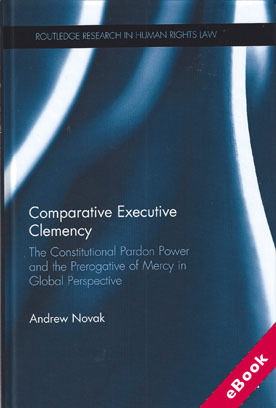
The device(s) you use to access the eBook content must be authorized with an Adobe ID before you download the product otherwise it will fail to register correctly.
For further information see https://www.wildy.com/ebook-formats
Once the order is confirmed an automated e-mail will be sent to you to allow you to download the eBook.
All eBooks are supplied firm sale and cannot be returned. If you believe there is a fault with your eBook then contact us on ebooks@wildy.com and we will help in resolving the issue. This does not affect your statutory rights.
This book provides a comparative constitutional analysis of executive clemency, with a focus on death penalty cases.
In the Commonwealth today, legal frameworks and clemency proceedings differ markedly. In some countries, the decision is one for the executive alone, while others have delegated this power to an advisory committee. The role of legislatures varies as well: in some countries, legislative assemblies can appoint or approve members of a clemency or pardon board. Today, international tribunals recognize a human right to seek clemency, reprieve, or pardon, and forbid such executions while such a request is pending. In general, the trend is toward rationalization of the clemency process, involving more actors in decision-making and diluting the unchecked discretion of a single individual.
Focussing specifically on death penalty cases, as these are the most urgent, this book argues that improving the rationality and transparency of the clemency process will not only benefit executive decision-making, but will contribute to death penalty abolition in the long-term by increasing the structural costs of executions, a process well underway in India and the Caribbean. Comparative executive clemency has never been the subject of a full-length comparative constitutional analysis, and the breadth of jurisdictions contained in this book—encompassing the entire English-speaking world—provides a full range of cultural and political variations in the level of deference given to executive decision-making.
This book will be of great interest to scholars of international and comparative criminal justice and international human rights law.